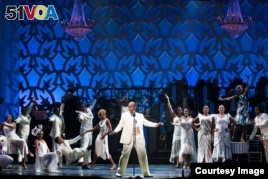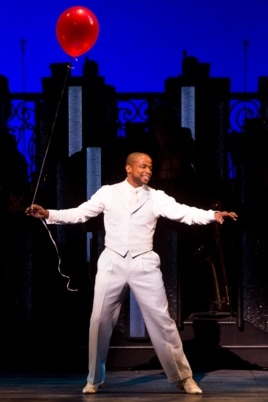February 04,2014
NEW YORK — From the early 1920s to 1940, Harlem’s Cotton Club was the showplace for African-American performers in New York.
Lena Horne, Duke Ellington, Cab Calloway, Bessie Smith and the Nicholas Brothers are just a few of the artists whose work is interpreted in a new revue on Broadway called After Midnight.
New York University History Professor David Levering Lewis, author of When Harlem Was In Vogue, thinks the show does a pretty good job of recreating the legendary nightclub.
"I thought it captured the flavor of what would have been one night - the best ever - at the Cotton Club," he said.

The cast of Broadway's "After Midnight." (Photo by Matthew Murphy)
After Midnight began as a collaboration between Wynton Marsalis, the artistic director of Jazz at Lincoln Center, and Jack Viertel, artistic director of Encores, an organization that puts on concert versions of old musicals. Viertel says they both feel close to the subject.
"I have a fixation with Harold Arlen, who started his career, or early in his career, wrote songs for the Cotton Club," Viertel said. "And Wynton has a lifelong obsession with Duke Ellington, and, while Arlen was writing songs for the Cotton Club, Duke Ellington was the house band of the Cotton Club.
 Dule Hill in Broadway's "After Midnight." (Photo by Matthew Murphy)
Dule Hill in Broadway's "After Midnight." (Photo by Matthew Murphy)The Cotton Club was owned by a Chicago gangster named Owney Madden as a way to sell liquor at inflated prices during Prohibition, when the sale of alcohol was banned.
While it was located in the heart of the African-American neighborhood of Harlem and showcased black performers, it was open to whites only, says historian Levering Lewis.
"As everyone knows, it was infamously racially-exclusive," Lewis said. "W.C. Handy wished to go one evening to The Cotton Club and he was turned away. And he could hear his music being performed."
That gives actor Dulé Hill pause.
"As much as we try, I don’t think we’ll really ever understand what that felt like; to come on the stage and to be so fabulous and to be so amazing and to be so elegant and classy, but not be able to sit down," Hill said.
Hill, who’s best known for his work in TV, serves as master of ceremonies, reciting poetry by Langston Hughes, as well as singing and dancing.
The original Cotton Club revues featured some offensive racial stereotyping, which Viertel says the show consciously avoids.
"I think we decided that one of the services we could do for the artists who created the work originally was to give them an opportunity to be liberated from that circumstance," Viertel said. "We didn’t think it would serve them, or our current cast or musicians to try to, sort of, circumvent the joy of the art with the shame of the social reality, which continues in this country in various ways up to this very day.
After Midnight is not trying to whitewash history, says Hill.
"It’s not that we’re brushing it underneath the rug and saying 'No, don’t pay any attention to that,'” he said. "No, that informs everything we’re doing. But we’re choosing to celebrate and life is all about choice. And so is art.
By choosing to celebrate the art of the entertainers who made the Cotton Club famous, After Midnight is giving a new generation a chance to discover the music, dance and magic of an earlier era.